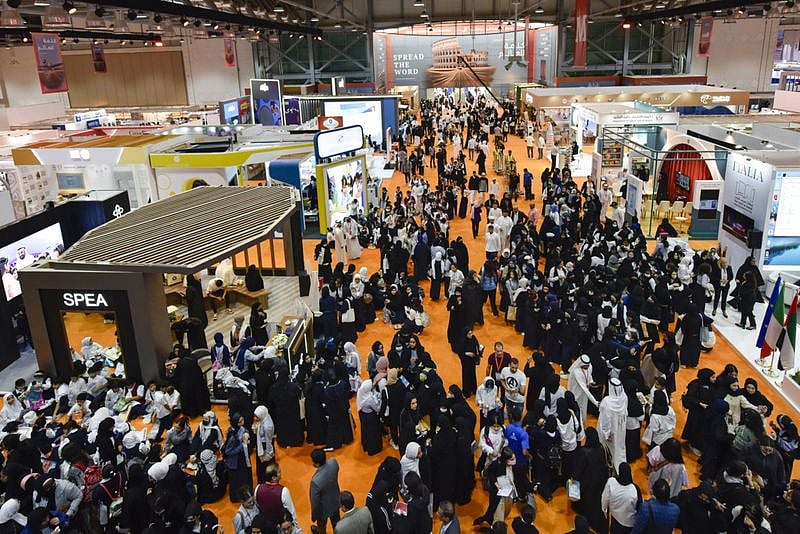Sharjah Book Fair 2025 opens: Why a child without books misses a whole world
Books allow you to escape into a world that you didn't know that you needed

There’s a little bookstore in Delhi’s Aurobindo Place, called Midlands.
And that’s where I spent most of my childhood. It was a ritual, possibly since I was four. Whenever my parents went shopping, they would drop me off at the bookstore, and I would pull out a book and read, as if it were a library. Far from ever reprimanding me, the kind owner would encourage me to read further, and whenever we left the store, I had several books tucked under my arm, that would just fill up the shelves in our home. My parents never held back from expenditure on books: It was the best thing to spend on.
It was a childhood filled with books, sitting by my father’s side as he taught me how to read Peter and Jane, before I moved to Enid Blyton’s Famous Fives, making it a challenge to read all 21 of them. Secret Sevens, Adventure series, Five Find Out-ters, followed. As I was just surrounded by people who loved reading and wanted me to read. Birthday gifts were books, from Roald Dahl sets to entire collections of Goosebumps, and the most special birthday being, a gift of four Harry Potters. My first brush with literary grief was Sirius Black's death; a broken Harry keeps looking at the mirror, and hoping he would return.
A year later, I was given Lord of the Rings, and I spent every free moment reading it, asking my father about words and concepts that I did not understand. Moreover, my father answered every question, clarifying each doubt about the overwhelming amount of characters, and being a historian himself, provided me with context about Tolkein’s own background and history. It was a breakfast conversation before going to school: Talking about each chapter that I read, one particular episode being The Knife in the Dark in the series. I reveled in these worlds of fantasy, the language of the elves and had even learnt the Ring poem. I was so inspired that I tried inventing my own language with a full index, just as Tolkein did.
My world was Narnia, Hogwarts, Shire and where Enid Blyton’s meat pies, ‘delicious’ sandwiches were all accessible in a larder. Later, I devoured the entire Anne Shirley series by LM Montogomery, which is still my comfort read, even today. Montgomery’s red-haired, grey-eyed Anne, a passionate lover of nature and blue skies, had the gift of imagination; she didn’t see a lake as just a lake. It was the Lake of Shining Waters, and everything had a mystical name. Through Montgomery, I discovered a love for valleys, ponds, and quiet winds that blow. There’s peace in stillness, as Anne taught me with her words.
And, when you fly with your imagination, you’re free.
Those invented worlds threaded into our play. My cousins and I pretended to study at Hogwarts, brandishing sticks as wands. We insisted a wardrobe hid another world, and my mother would play along. We were detectives solving high-stakes mysteries that inevitably revolved around a classmate’s secret stash of toffees. Like George in George’s Marvellous Medicine, we brewed dubious “potions.” We treated a stuffed black cat as if it were real and drew circles around her as if casting spells.
That’s what books did. It fired our imagination. You travelled worlds without ever moving your feet. It’s what led me to writing stories too, something I started at the age of five, attempting to create similar magical universes that might have been a little too similar to the ones I read. (Sorry, a seven-year-old didn’t quite understand the morals of plagiarism at the time, so I wrote Kerry Velden and Wandering into Wonders, which was a weird mash-up of Harry Potter, and HG Well’s science fiction).
But I’m grateful to my parents for allowing me to create these little worlds, while living in homes that were filled with bookshelves, more than anything else. Without them, I wouldn’t have found the magic and enchantments that made me believe the world is a lot more than it seems.
Maybe that's what children need to believe. And for that, they need books around them. There’s a different pleasure of escaping into the world of words, chapters, anticipating, predicting what can happen next.
There’s joy in sweet endings. But, the frustration of open endings needs to be felt. There are so many interpretations of lines and words that leave you grappling, and moreover, many authors aren’t even alive to clarify it: And so you keep reading more, to see what others say, agreeing or disagreeing with them. Let your brain be picked. Don't know a word? Grow your vocabulary. And don't be swayed by fiction versus non-fiction: Fiction quietly carries its own history; we just need to read between the lines. Oliver Twist and David Copperfield might be fictional, but the stark narratives will tell you enough about life in England in those times.
Wrench your thoughts around an author’s meaning. Imagine how the story might have shifted if a character had chosen a different door. Walk in the character's shoes. And that's what book clubs and communities are for: I have immense pleasure in being a part of a book club, where I hear the most diverse opinions on a book. If I missed out on a detail, my sharp-eyed friends discuss it.
What I might love, someone else might detest, and vice-versa.
You plan the alternate endings, write that fan-fiction. Fall in love with those fictional characters. Live in that world of dragons.
That’s the world a child needs. One filled with magic.
Network Links
GN StoreDownload our app
© Al Nisr Publishing LLC 2026. All rights reserved.